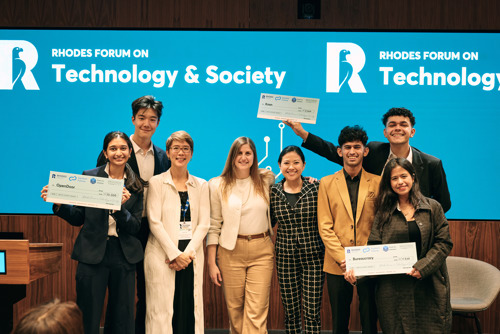Abilash Mishra opened the plenary panel with the idea that Abundance is the conviction that societies can build systems where housing, education, healthcare, and the essentials of a dignified life are not scarce resources but shared and renewable possibilities for all.
Fundamentally, abundance is about enabling human dignity and supporting every individual’s right to realise their highest potential. It is this orientation that framed the central question guiding this year’s Kevin Xu Innovation Challenge: How might we build AI systems that increase human agency and dignity-not by automating away choice, but by amplifying it?
The presentations that followed offered diverse and compelling interpretations of that question. Each one reflected a belief that technology should extend human capability, not replace it and that AI can be a partner in widening access, restoring agency, and enhancing dignity.

This year’s winners, OpenDoor, offered a compelling vision for breaking the cycles of hopelessness and chronic inaccessibility that shape so many underserved communities. They invited us to reimagine neighbourhoods like Skid Row in Los Angeles, not as places defined by poverty, but as communities transformed through connection, clarity, and opportunity. Their presentation was so resonant that we could all instantly imagine the impact of this solution in our own ‘Skid Rows’ and see the possibility of a better future for social care.
OpenDoor’s diagnosis of the problem was clear: social challenges often persist not because resources are lacking, but because information is fragmented and individuals in need are not effectively connected to the support that already exists. Their solution, a website and mobile application that integrates service-matching, eligibility screening, and job-training pathways, demonstrated how thoughtfully designed AI and matching systems can close these gaps with speed, accuracy, and scale.
They estimated that in a social care landscape where an estimated $10 billion in the U.S. and $150 billion globally in government and non-profit funding goes unused each year, even a modest improvement in access can have transformative impact. By their calculation, enabling just a 1% increase in uptake could translate into $100 million in unlocked benefits for communities that have long been underserved.
This team’s presentation was a reminder that when AI is used to expand human agency and streamline access to essential services, it does more than improve systems it creates abundance by restoring human dignity and enabling the pursuit of human dignity.
The runners-up, Bureaucrazy, showed that bureaucracy in Nepal doesn’t have to be overwhelming or ‘crazy’, it simply must be accessible. Their team introduced an AI-powered chatbot designed to give citizens clear, reliable, and easily navigable information about the public services they depend on. They illustrated the agility of their solution through a timely example: when national elections approached, the chatbot seamlessly adapted to support Nepalese citizens with voter registration guidance and accurate, up-to-date voting information. In doing so, Bureaucrazy demonstrated how thoughtfully deployed AI can strengthen democratic participation and democratize access to information.
The additional runners-up, Koan, introduced the Forum to a learning management system that pushes pedagogy forward by enabling students and teachers to work with AI rather than against it. Their solution leverages context-aware learning to provide personalised support, helping learners understand and focus on the process of getting to an output rather than the output itself. By integrating AI as a collaborative partner in the classroom, Koan offered a vision of education where technology strengthens critical thinking, deepens understanding, and supports teachers in delivering more responsive, human-centred instruction.
The three additional presentations, brought forward powerful ideas and meaningful innovations that enriched the overall vision of the Challenge. Gensight AI introduced a mobile app that serves as both a demand translator and an empathetic navigator for genetic reports, supporting families caring for members with rare genetic conditions. CivicHelper showcased a website designed to guide case managers in providing the right forms at the right time, simplifying access to essential public services for citizens. Vocam presented a visual, context-aware learning tool tailored for neurodivergent individuals, offering a more intuitive and inclusive approach to education and learning.
Collectively, these ideas demonstrated the power of intentional design and design that refuses to treat technology as neutral or inevitable but instead treats it as a tool for shaping humane, inclusive futures. They asked us to imagine what could be possible if AI were purpose-built to expand possibility, deepen participation, and support human flourishing at scale.
This year’s Kevin Xu Innovation Challenge serves as a reminder that abundance is not a distant ideal. It is something that we can build when we expand possibility through collective action, shared imagination, and a commitment to creating futures in which all people can thrive.
